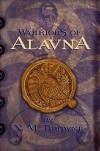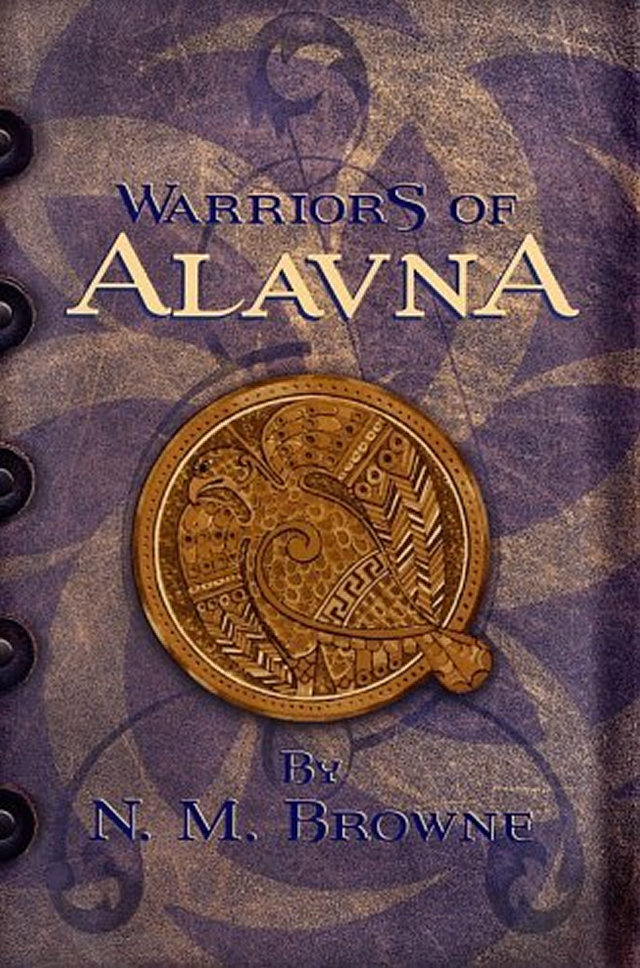
The Plot
Dan and Ursula are two British teenagers on a school field trip. A strange fog envelops them and the two find themselves transported to a strange new world where there are still Romans and Celtic tribesmen. Once there, they’re thrown into a deadly conflict for which neither is prepared, but with which they must deal if they’re ever to have a chance of finding a way home.
My Thoughts
Somehow, even though I’m the one in charge of creating the “Upcoming” page on Tripletake, I had not actually read the blurb I pasted in for this book. The result being that my impressions of the book, formed from only its title, were completely wrong. It was nothing like what I expected (which was, of course, relatively high fantasy centering around a land called Alavna).
We begin instead in Hastings (as in Battle of) where Ursula and Dan, unwilling partners on a school field trip, have found themselves in the middle of a clinging yellow mist. Dan is a smart, athletic, popular kid while Ursula is apparently an outcast who has low self-esteem due to her height (tall) and build (heavy). These facts turn out to be rather less important than one might expect in a young adult novel. The point of view shifts between Ursula and Dan throughout the whole book, but it’s most noticeable here at the beginning, where we’re most in their heads. Dan’s point of view is presented in short, nearly clauseless sentences, while Ursula’s sentence structure is more complex. It was an interesting contrast but for me, it made reading Dan’s sections difficult. It felt like the equivalent of being in heavy traffic — you’d move for a couple seconds and then jerk to a stop again. Repeat.
Ursula and Dan emerge from the mist into somewhere different — a land which might be Britain of the distant past or might not. In any case, the situation there is much the same as the situation in Britain during the middle of the Roman occupation. The Celtic tribes are finding their way of life threatened, their lands taken, their authority usurped; in desperation, they’ve been trying to use magic to lift the Veil and summon help from elsewhere. What they got was Ursula and Dan, who don’t feel especially useful.
Of course, the reader knows this will turn out not to be the case: they will obviously hold the key to solving the tribes’ problems, at least in the short term. It wouldn’t be much of a story, otherwise. Dan’s ‘talent’ is revealed fairly early on in the story: he’s what the tribes call a ‘bear sark’, aka a berserker in the grandest tradition of the word. He can turn into an unstoppable killing machine in a disturbingly easy way (disturbing to himself perhaps more than the reader) and go Hitokiri Battousai on all the bad-guys.
Ursula’s purpose is developed more slowly, and it’s she more than Dan who ends up as the central figure of the book. The Celts who summon her and Dan mistake her initially for a boy and this ruse is continued for a very large part of the book. Though it strains credulity for portions of the beginning, it’s a necessary ploy to keep her involved with the male warriors who making the decisions for the tribes. While there’s some lip service paid to the idea that the Celts were a relatively equal society whose womenfolk are known to fight alongside the men, we never see this in practice and the men all seem content enough with the patriarchy, new or not.
The plotting is well-paced; there are no sections of the book where there are too many incidents and others where there are too few. The final battle in particular was impressive, conveying as it did the hectic confusion of what an actual battle of the sort might have been like.
Overall, I’m left wondering why I don’t find myself more enthusiastic about the book or more interested in reading the rest of the trilogy. The lack of good female characters may be one reason; there are only two in the book of any note: one a bitchy screwup and one, Ursula, who spends her time disguised as a boy. Maybe it’s because I didn’t really start to feel a connection to the characters until the very end, right when it was clear that everything was about to change again — the next book may be a continuation, but it probably won’t be a continuation of this particular set of circumstances. I don’t know. All I can say is that it didn’t excite me, but I don’t entirely rule out finishing the series.
In Short
In the end, I have mixed feelings about this book. Browne is a good writer, and yet there are other good writers whose stuff I just don’t enjoy. The story itself was pretty solid, but at the end of it I felt like I still had a pretty shallow feel for the two main characters, Ursula and Dan. I was told that they had changed and grown, but since the book started and stopped without any real look at them in the ‘real world’ I have no particular evidence of them either before or after these incidents. There was a distinct lack of female characters, and our one lead female spends almost the entire book pretending to be a boy; the only other prominent female is jealous, impulsive and behaves like a fool. For that alone I should dislike it, but knowing it’s part of a trilogy leaves me with the hope that like many series, it’s much better when taken as a whole.


You know, (re)reading your review, I’m left more befuddled by the book than before. It’s.. not good, but in very odd and different ways. And I’m left with more questions.
Was Dan always a berserker and it just hadn’t come out in him yet? Or did something happen to him when he crossed over? Why was his first instinct on finding a dead girl in the woods to find himself a sword that he could barely lift and should’ve had no knowledge of how to use?
Why do the both of them go along with these people and even start to like them when they have very few redeeming qualities at all? Why do they apparently have very little to no urge to go home? It’s not like they’re having a super swell awesome time! It’s not Neverland, Oz, Wonderland, Narnia, or even Kansas! It’s pretty horrible, akshully!
Why are these people so enamored of bathing? Isn’t that a Roman thing? Shouldn’t they reject it? Bathing more than once a year is unhealthy!
Well, I feel like most of the questions in your middle paragraph were answered adequately by the text.
Why do both of them go along with these people and even start to like them when they have very few redeeming qualities at all?
First, they’re the first people they meet. They know they’re from another world and thus accept they may be weird. This is actually a fairly major thing — Ursula and Dan have no guarantees the Romans would care or do anything for them. Plus, Ursula drinks the magic potion that lets her speak Celtic or Gaelic or whatever language it was they were using. Even though Dan apparently speaks Latin, she doesn’t know any of it. All the same at one point they do think about going to the Romans and ultimately decide against it, since the Romans seem just as bad.
Why do they apparently have very little to no urge to go home?
I don’t get this? They’re pretty consistent about wanting to go home. But for most of the book they are convinced they need Rhonwen’s assistance to go home; it’s only very late that Ursula realizes she could probably do it herself. So they agree to fight with the Celts in the hopes that after, Rhonwen will send them back.
The rest of your observations, well… no. You’re right. Those things don’t make any sense if you poke at them. Dan comments early on that his berserkerness seems to come from the same place of concentration he can achieve when playing sports, but obviously he doesn’t go on a wild rampage and kill people on the football field so I honestly don’t know why this is thought to be an adequate explanation. I think it’s meant to be like Ursula’s magic — his special talent that he acquired when he arrived in the world. But it’s kind of a crap one. He doesn’t seem to -improve- his skill over time. He trains to be a better warrior, but his berserkerness gets harder to control, not less.